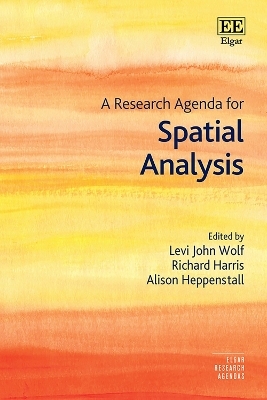
A Research Agenda for Spatial Analysis
Edward Elgar Publishing Ltd (Verlag)
978-1-80220-322-6 (ISBN)
This Research Agenda explores the future of spatial analysis, and how the field informs and challenges the policy landscape. A wide range of contributors from different intellectual communities address the problem of causality in geographic analysis, arguing that diversity is crucial for the future success of the discipline.
Chapters define and explore specific concepts and practices within the field, for instance data science and geosimulation, providing perspectives on the current state of the art of these areas within geography, and how they will shift in the future. In the first section, contributors cover the fundamentals of the topic, as well as various ways to handle the ‘spatial variable’, including the concept of space, the scale of spatial patterns and what those patterns reveal. The book then analyses schools of practice, including geographical data science, causality, generative modelling and machine learning.
A Research Agenda for Spatial Analysis will prove an invaluable resource for spatial analysts and geographic information scientists interested in learning about the direction of future developments in the field. Additionally, scholars and students of human and urban geography and geographic research methods will benefit from this crucial overview of the topic.
Edited by Levi John Wolf, Associate Professor of Spatial Analysis, Richard Harris, Professor of Quantitative Social Geography, School of Geographical Sciences, University of Bristol and Alison Heppenstall, Professor of Geocomputation, School of Social and Political Sciences, University of Glasgow, UK
Contents:
Introduction to A Research Agenda for Spatial Analysis 1
Richard Harris, Alison Heppenstall and Levi John Wolf
PART I CONCEPTS IN SPATIAL ANALYSIS
1 Linking spatial pattern to process: an old
challenge with new barriers 13
Trisalyn A. Nelson
2 Reconstructing the map 27
James Cheshire
3 Space: towards a global sense of place 39
Luke Bergmann and David O’Sullivan
4 How to solve the scale “problem” in spatial analytics 55
A. Stewart Fotheringham
5 Reproducible research, and research into
reproducibility: review and prospects 67
Chris Brunsdon
PART II COMMUNITIES OF PRACTICE IN SPATIAL ANALYSIS
6 Geographic data science: a manifesto 85
Daniel Arribas-Bel and Anita Graser
7 Causal, not casual, spatial data science 97
Gareth Griffith, Gwilym Owen and Meng Le Zhang
8 Generative modelling and geosimulation 113
Clémentine Cottineau
9 Progress on machine learning applications in geography 127
Stephen Law, Yao Shen and Chen Zhong
10 Earth observation 147
Michelle Stuhlmacher
11 Integrated science of movement: crossing the
boundary between human mobility and animal
movement research 159
Urška Demšar
12 Spatial interaction modelling: a manifesto 177
Francisco Rowe, Robin Lovelace and Adam Dennett
13 The neighbourhood: where Wilson, Schelling and
Hägerstrand meet 197
Ana Petrović, Maarten van Ham and David Manley
Conclusion: spatial analysis – the geographer’s art? 209
Richard Harris, Alison Heppenstall and Levi John
Wolf
| Erscheinungsdatum | 08.05.2024 |
|---|---|
| Reihe/Serie | Elgar Research Agendas |
| Verlagsort | Cheltenham |
| Sprache | englisch |
| Maße | 156 x 234 mm |
| Themenwelt | Naturwissenschaften ► Geowissenschaften ► Geografie / Kartografie |
| ISBN-10 | 1-80220-322-2 / 1802203222 |
| ISBN-13 | 978-1-80220-322-6 / 9781802203226 |
| Zustand | Neuware |
| Informationen gemäß Produktsicherheitsverordnung (GPSR) | |
| Haben Sie eine Frage zum Produkt? |
aus dem Bereich


